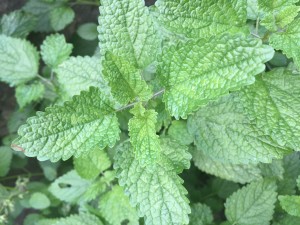DR. TERI GOETZ
Find the Cause. Treat the Root. Heal Yourself.
Find the Cause. Treat the Root. Heal Yourself.
Healing Herbal Teas III: From Calming Nerves to Benefiting the Thyroid
This week’s two herbs are perhaps not quite as common and everyday as sage and oregano. Surprisingly few people have experienced lemon balm and many folks know mint only in its candied incarnations—not the best way to experience this healing plant.
Lemon balm (Melissa officinalis) – calms the nerves, helps with sleep and benefits the thyroid

Calms nerves, helps with sleep, and benefits the thyroid
Lemon balm is a common ingredient in commercially packaged herbal teas for its delicate lemony taste. It is also used in other beverages—famously the liqueurs Benedictine, B & B, and Chartreuse. Lemon balm is much more than a flavorful herb, however. It can do everything from calm nerves to help with herpes and chronic fatigue. Here are some of the benefits of using lemon balm as a healing herb when used in a pure, unfermented, fresh or dried form:
- calm nerves
- help with sleep
- relax muscles
- relieve cramps, gas, bloating
- help with UTIs
- anti-viral, especially herpes virus
- reduce swelling and redness
- benefit the thyroid
- help with chronic fatigue
As you can see, lemon balm is another powerhouse herb. It is commonly used to as an aid for sleep, anxiety-reduction, muscle relaxation (especially for the muscles in the bladder, uterus and stomach, thereby helping with cramps, bladder pain, gas, and bloating). The European Scientific Cooperative on Phytotherapy recommends its internal use for restlessness, tension, irritability and externally for herpes labialis. Additionally, it has recently been shown to increase focus and mental clarity. As an anti-viral (contains caffeic acid and rosmarinic acid) it can be used topically to treat herpes simplex virus and shingles. (I SO wish I’d had this when I was suffering from shingles on my trip earlier this summer!) It’s also reported to reduce swelling and redness, and have a beneficial effect on the thyroid and chronic fatigue.
Mint (Mentha) – Soothes the stomach, helps with IBS and respiratory and skin issues

Soothes your stomach, helps with IBS, respiratory and skin issues
Thinking outside the doublemint/mojito/Peppermint Patty box, we see that mint, which grows like a weed and lasts in your garden from May to September, is one of the most soothing of herbs. Mint:
- soothes your stomach
- is anti-microbial
- freshens breath and helps prevent cavities
- helps with respiratory issues
- is a good source of manganese, copper, and vitamin C
- contains high levels of antioxidants
- helps the skin
We’ve all experienced mint in some capacity and there are more than 25 different varieties. We know it to be cooling and delicious, but in fact mint has a multitude of properties because of the menthol and volatile oils in it. Mint has been deeply studied in its leaf form but especially as an oil. Don’t worry: when you steep mint in the hot water, you will be extracting some oils into your tea.
As a good source of manganese, copper, and vitamin C, mint is extremely successful at relieving symptoms of irritable bowel syndrome (IBS). It reduces colonic spasms and probably relaxes the muscles in your stomach, allowing you to pass gas more effectively and ease abdominal pain. It has been shown to enhance gastric emptying and help with stomach aches. (Try both tea and essential oils in water to see what works best for your gastric upset.)
Mint is also a boon to breastfeeding moms because it helps prevent cracked nipples and pain. Peppermint oil has been shown to substantially and quickly relieve the pain and duration of shingles. It also seems to help with drug resistant herpes simplex 1. The aroma enhances alertness and studies show that mint (both as an essential oil or as a tea) decreases post-chemo nausea. Menthol from mint may inhibit prostate cancer cells. It may also help with radiation damage by protecting DNA and decreasing cell death.
We all know that most toothpaste contains peppermint flavor. It not only makes your mouth feel nice, but peppermint oil seems to inhibit the formation of biofilm—linked to cavities— on teeth. I’ve been experimenting with “oil pulling” and I’m pretty impressed (more on that later). You can also make your own toothpaste pretty easily and adding peppermint oil to water will make a great mouthwash—without nasty chlorhexidine.
Peppermint is helpful with respiratory ailments. Studies show that inhaling peppermint oil inhibits histamine release and therefore helps with seasonal allergies. It contains rosmarinic acid, which can help reduce inflammation associated with asthma, and it helps open up respiratory passages and relieves congestion and cold symptoms. It’s also stress-reducing. Just smelling the tea, taking a moment to really breathe it in, can make a big difference to late afternoon doldrums and fatigue.
Next week I’ll give you the 411 on cinnamon and astragalus. Be prepared for more cool info about nature’s pharmacy!

